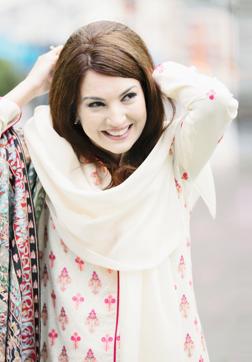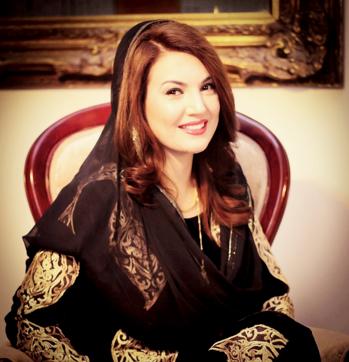Doormats are rarely valued: Reham Khan
Cricketer-turned-Pakistan PM Imran Khan’s ex-wife, who penned her autobiography, says instead of exhausting themselves in finding a good man and then keeping him from straying, women should celebrate their own achievements
British-Pakistani writer Reham Khan recently made waves for her autobiography outlining her twin troubled marriages, one of them to former Pakistani cricketer Imran Khan, now that country’s prime minister. The book put her on the hit list of trolls and invited death threats, besides being called “vile” and “scandalous” with allegations that it was meant to destroy Imran’s political career just before the polls.

While details about Imran’s private life made headlines, it overshadowed the fact that the book also told the story of a woman who suffered, believing she was duty-bound to please the man in her life. In the story of her struggle to rebuild her life lies a message for countless women in the subcontinent, who find themselves trapped in traumatic marriages and silently put up with abuse, blaming only fate.
“Being the woman who tolerates all hardships for her man is a concept that a patriarchal society glorifies. Woh kahin bhi gaya, lauta toh mere paas aaya… says (poet) Parween Shakir. Be it poetry, our films or the very sexist TV soaps, a woman is portrayed as the perpetually crying wife who has to win over the unfaithful husband. The ideal woman is one that suffers quietly, dictates patriarchy. Why does a woman have to make endless sacrifices to win the right to be loved?” asks Reham. “Doormats are rarely valued. Men actually like women who are not that obsessed by the man in their life. I made the mistake of being too agreeable and catering to every need of my man. I had this complex of being the perfect wife. This comes from the subliminal messages girls learn from a young age, so even independent, spirited women like me entertain such notions,” says Reham, who married her first cousin when she was 19. After her divorce, she started working as a journalist, and married Imran in 2015. Their marriage lasted for one year.
The hell that Reham lived in both her marriages helped her counsel other women out of abusive relationships. But the biggest obstacle she faces is that most of them are convinced they are at fault. “Many proclaim to be feminists yet put up with abusive relationships themselves. In an abusive relationship, the perpetrator attacks your self esteem and the victim believes that they are at fault. The victim is made to feel ugly and incompetent. With their confidence crushed, they end up believing no one will love them and their fears multiply,” says Reham.
Reham herself was labelled a very bad woman as she didn’t put up with bad relationships. “In the subcontinent, in the event of a woman walking out on a man, it is always considered to be the woman’s fault. Society is obsessed with the image of a long suffering wife as the ideal. I try to teach people that there is nothing great or graceful in putting up with men behaving badly,” she says.
Reham urges women never to put up with deception in a relationship for the sake of society, children or parents. “Women need to snap out of this sati-savitri complex that I have had all my life too. Being the woman who perseveres in hardship for others is a concept a patriarchal society glorifies. Children who grow up in households where the mother is teary-eyed or in pain can’t snap out of this vicious cycle. Both my husbands hated their fathers for making their mothers so unhappy but they could not be different. They could not learn to be good husbands,” she says. Talking about love, Reham says even the most intelligent and spirited women keep falling for wrong guys, as they are tricked into believing it’s love. “I think I was in love with the idea of love like many women are. It sadly doesn’t exist the way we see in films and novels. Men say things to convince us. The more experienced a man is, the better he is at convincing. I believed Imran when he said he had never met a woman like me and that he really needed my support. I should have been smarter but I was naïve. The problem is simple. We women don’t think whether we like the man or not. We like the fact that he is besotted with us,” says Reham.
Also, with very limited interactions with men all her life, she says she became an easy prey. “I missed out on going to a university and was married in my teens so never really learnt about the opposite sex. I then became a working single parent to three young children. I never got a chance to socialise with men. Imran pursued me like no man had and he talked about saving Pakistan and the poor. The social activist in me fell for it all,” she recalls.
After two traumatic marriages, Reham believes women should learn to find happiness in their own achievements. “I see women worrying about ending up single and society telling us they need a man to protect and provide for them, but whenever I have been single I have had no grief in my life. I have been able to focus better on my children and my career and been happier and relaxed. People even say that I look better when I am single because obviously there is no stress. So what do I need a man for?” she says.
‘Women can’t be treated like a minority anymore’
Reham believes that what makes it so tough for women is the fact that religion is often used as a tool against them. “Religion has been always misinterpreted deliberately to suit the needs of patriarchy. Women have been denied their rightful role purely because of the hierarchy of men. From village panchaiyat to senior judges, the slots are all occupied by men,” she says.
She says that women have always been vulnerable to abuse because men make the rules. “Women political leaders who make it to the top are under pressure from more men at the top. We have been treated like a minority. This has to change. We need to increase our numbers in key positions , cooperate and collaborate. Women leaders who reach authoritative positions must become braver and unselfish for other women who are not as privileged,” says Reham.

It wasn’t easy for Reham to share her story with the world. “It was a process of getting here. I was once as scared as any other woman might be but slowly I broke the barriers...one by one. First, I broke the barrier my own mind had set that I can’t do it. Before people pigeon hole us, we as women slot ourselves into a weak, vulnerable category. We are very strong. We just don’t know how strong we are until we are tested. I knew only I could write this bold account. I have earned my independence . There is no mother-in-law, husband ,boyfriend or brother dictating to me. I have no material trappings, so I can speak like no one else can,” she says and hopes that it will encourage other people to speak about what they know.
A lot of hatred and even death threats came her way, she shares. “I knew the consequences. I was told in detail how I would be abused, how my security would be threatened and how many obstacles will be created. I was given death threats but I felt it was a civic responsibility to disclose all that I knew. Why else would I have been a witness to it all? It was simply the right thing to do,” she says. Reham chose to ignore hatred and negativity. “The bowler will throw some wides, some no balls, some bouncers. I don’t have to play them all. Well left is a good idea sometimes,” she says.
‘There is no such thing as forever’
Reham believes that essentially there are no forevers in this world. “We can’t have the same friends all our lives either because our circumstances may change our geography may change. To sustain a marital relationship one must have honesty from the outset. You must be clear that it is shared values bringing you together not just physical attraction. You should marry someone you enjoy talking to. Someone who is a friend to you. I do not agree with this concept of living separate lives either. The more time you spend together it will bring you closer,” she says.
She says that a lot of relationships breakdown because of material issues, which is sad. “We equate happiness with material comfort. The size of the diamond cannot accurately depict someone’s love. A marriage is not for the world. It should be your safe haven. It is your battery charger for all the apps you have open on your screen,” she says.

‘It’s women who will bring the change’
Reham visited India in March 2016 for a conference on women rights and loved the friendly vibes of the country. “I was received so warmly as I crossed Wagha that I was surprised. There is so much love we have for each other and the culture is of course the same, so it feels like home. The women I met were all so ballsy and I felt that it will be our women who will change things,” she says.
However, in Delhi, Reham felt sad to see that two nations are battling the same woes. “As I visited the street children and refuge centres, my heart bled for the poverty our children battle with on a daily basis. It seems our politicians and policy makers have failed us on both sides of the border,” she says.
‘After seeing the poverty in Pakistan, designer outfits seemed an irresponsible choice’
You see Reham Khan dressed in lovely shalwar kurtas paired with printed or embroidered dupattas, a far cry from her boardroom chic look she preferred in England. “When I started working on the BBC, I was given a stylist and I would wear a lot of high end designer wear. My look, particularly my huge collection of high heels were a huge hit with the rather discerning audience of the South of England. I continued with the Western power suits in Pakistan for only a few weeks because as I travelled across the length and breadth of Pakistan, I saw the poverty, the designer outfits seemed an irresponsible choice,” she says. Reham ditched them for shalwar kameez with traditional embroidery and 100 percent Pakistani cotton outfits.
After marrying Imran, she permanently adopted the white sheer dupatta that Fatima Jinnah, the PTV announcer of the 80s wore. “I wanted to give a clear message that my identity was Pakistani. Much has been said about it being a religious statement but it is not. It is to promote Pakistani culture. I love our vibrant coloured shawls and chadders and wear them to promote the heritage,” she says. The side parting and the sixties inspired hairstyle was adopted to save time in hair styling and to keep hair away from her face.
Reham says that she also stopped wearing expensive jewellery since she believes it is vulgar to show off wealth in a country where there is no drinking water for children. “I have an aversion for wearing items that are reminders of chaining women like the nath or choorian (bangles). I think very carefully now that if I wear something, a young girl will want to copy it. It is important for me to say that you can look good on a budget and that you should put comfort first. I was so pleased when I found that thousands of women copied my wedding look of light makeup and flowers and an affordable outfit,” she says.
Reham is a big Bollywood fan
Reham and her kids happen to be big Bollywood buffs, like so many other Pakistanis. “My kids speak fluent Urdu so they are know all the gossip, too. From Qayamat Se Qayamat Tak to Bajirao Mastani, we haven’t missed anything. There is a raging war in her house on Ranbir vs Ranveer. My kids love family films like Hum Saath - Saath Hain. They also love the concept of joint family systems. Our own family is very close and we enjoy films that promote it. Dil Dhadakne Do,” she says.
Reham is also a huge fan of Sanjay Leela Bhansali. “We love the music and the song sequences in his films,” she says. The only thing she disliked about Bollywood was the stalker behaviour of heroes in the past. “But recently this is also been addressed, too. Aaj nahin toh kal maan jayegee is a disturbing concept and must be put to rest,” she says.

Reham has a lot on her plate with two engrossing projects lined up. She is currently working on two scripts. “One is a period drama on Khushal Khan Khattak, the Pushtun warrior and poet. The other is a net series on the murky world of media and politics,” says Reham.
Catch your daily dose of Fashion, Taylor Swift, Health, Festivals, Travel, Relationship, Recipe and all the other Latest Lifestyle News on Hindustan Times Website and APPs.
Catch your daily dose of Fashion, Taylor Swift, Health, Festivals, Travel, Relationship, Recipe and all the other Latest Lifestyle News on Hindustan Times Website and APPs.






